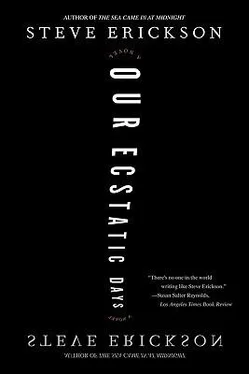All she knows she remembers is red. Two hours after having left San Gabriel, they beat the train to the Barstow station by ten minutes. After moving Lulu slowly up the stairs of the train and down the aisle to a seat, Brontë was bringing up the luggage as the train pulled out; the conductor came by and sold her two tickets. In the concessions lounge several cars down, Brontë buys water, a sandwich, fruit salad from a can. She’s alarmed when Lulu won’t eat. Lulu surfaces consciousness long enough to look out the window and say, Where are we? Seven or eight other passengers are scattered throughout the car; a couple of other women several seats up whisper between them. You have to eat something, Brontë insists, tearing off some more bread. “Where’s the lake?” says Lulu.
“At least drink some water.”
Lulu takes a sip of the water Brontë gives her. “Where’s the lake.”
“Behind us. We’re going to Chicago.” Chicago? Lulu asks; for
losing him all I could do was hate myself for not having taken him back to the
however much it means to either of them, Brontë might as well have said China. All Lulu knows she remembers is red. In her mind she’s been on this journey a long time, with its rails of green and yellow and its tracks of orange and purple (Tyrone the Train! I want to ride away with you …) as they rumble through the Mojave marshlands. After nearly forty-eight hours without sleep, Brontë sleeps until the train jolts her awake and pitches her upward; she’s momentarily disoriented, and for an instant she thinks Lulu is dead. Jeez, she cries softly touching the woman’s cheek, to which Lulu opens her eyes and turns to look at her. By this time they’ve been on the train all day. It seems to be moving slower and slower, crossing landscape more and more barren although, looking out the other side of the train, Brontë notes snow on far northern mountains. Every ten or fifteen minutes a tiny house glitters in the distance. Twilight falls in blueless magenta; a spreading red sky from the west is scratched with livid vapor trails, like God trying to claw his way in. Plutonium sagebrush blows south.
Lulu mutters in her sleep. Brontë gives her more water, trying again without success to get her to eat; then the younger woman dozes again and the next time she wakes, the train has stopped completely. In the night outside their window, symmetrically staggered in concentric circles around them and stretching out for miles like battlefield bunkers, single abandoned railway cars are lit by the lightning of a desert storm. The lightning is so fierce that the flash of it across Lulu’s face, as well as the tremendous thunder that follows almost immediately, wakes her as well. Brontë sits up looking around them. No one else is on the train except, at the far end, the conductor in his own seat; when he sees his last passengers have awakened, he saunters up the aisle.
silence of a dreamless delta, while at the same time I also believed it was
Pueblo d’Elektrik, he announces idly.
“Is this Chicago?” asks Brontë.
“Pueblo d’Elektrik. Last stop.”
“I thought this train goes to Chicago.”
“You have to transfer here. Nothing between here and Occupied Albuquerque and that’s another two hundred miles.”
“When does the Chicago train come through?”
“You’ll have to check with the station.” He leans down to look out the windows on the other side of the train. “Couple of days, I think. Station may be closed for the night.”
“A couple of days?”
“Might be open in the morning,” he says, “you can find out then. In the meantime you can probably get a room here at the pueblo. Yes,” he laughs at something he finds extremely funny, “you probably can. Yes,” he goes on laughing, “I would think so.” Brontë helps the older woman to her feet and moves her down the aisle. Down the stairs and off the train, she scurries Lulu to the shelter of an outside corridor that links the station to the railroad hotel next door, then moves the bags as the conductor watches. With Lulu and the baggage huddled against a wall, the younger woman darts from one dark window of the pueblo to the next, trying to see in. She finds a door and raps loudly; the rain and lightning and thunder grow. The conductor still watches from the top of the car as the train pulls out, heading down the track. Brontë has almost decided to break one of the windows when a light
because he was starved of his own umbilical dreams that the glistening yolk of
comes on and a freckled man with cropped red hair opens the door. We need a room, Brontë says.
In the shadow of the light behind him, the man with the red hair considers this. “It’s late”
“Yes, well, please explain that to the train that left us here,” Brontë snaps, pointing down the track. The man squints at the train disappearing in the distance. He seems to find the situation confounding until a particularly vicious crack of lightning catches his attention. He opens the door and Brontë hustles Lulu inside and brings in the bags. At the front desk she pays the man a deposit and the man gives the young woman a key to a room upstairs at the farthest end even though, as Brontë will learn, all the downstairs rooms are empty and there’s no other guest in the hotel except one whose light seeps out beneath the door three down from theirs. Slowly Brontë moves Lulu up the stairs, then hauls up the bags one by one as the hotel manager watches. She’s gotten the last suitcase up to the landing at the top in time to see an Indian girl a year or two younger knocking quietly on the door of the other occupied room; the light goes out and the door opens, and the girl glances over her shoulder at Brontë before slipping in through an electric white rip in the dark.
From their room in this section of the pueblo that juts out from the top floor, Brontë can see in almost every direction a molten desert bubbling with silver racket and tumbling from the navajo plateaus to the north. Outside the western window a grove of incinerated trees struggles skyward in black webs, and surrounding rings of single railway cars divert the storm from trains that slither through the countryside. The light and clamor are so relentless that all
Kierkegaard Blumenthal broke and emptied from me, and that night dropping
Brontë can do is huddle in her bed trying to decide whether to cover her ears or eyes; she wishes they had never left the lake. She’s only seen such fire and noise once before but can’t remember it. The next morning she finally gets Lulu to eat some cereal cooked by the manager’s wife; next door she finds the station still closed, and when it’s still closed that afternoon and the next morning and the next afternoon as well, she gets this feeling. Oh any time, says Roy the manager with red hair when Brontë asks what hour the station opens. Deep in the middle of the third night, in the middle of a dream she hears a rumbling and rushes to the window in time to see the light of a train disappearing down the track. Yes, replies Roy the following morning when she asks, anytime now that train ought to be coming back through here: maybe tomorrow or the next day. You said that yesterday, Brontë finally stops answering after a while.
After a while longer she stops asking. Built in the Nineteenth Century as the grandest estancia in northern Arizona by a Spanish aristocrat who fled San Sebastian in disgrace with his fortune, then eventually handed down to his great great grandson, the pueblo was finally lost by the family in the Wall Street crash of ninety-nine years ago. Serenely the great great grandson walked out through the adobe porticoes into the desert never to be seen again. Taken over by the Santa Fe railway, the mansion was converted into a railroad hotel. In the fourth and fifth decades of the Twentieth Century it bustled with travelers to and from the Midwest stopping for a meal or the night; with its sweeping entryways and arched passages and suspended staircases, the pueblo was all blue tile and hacienda-deco then. A quarter century ago the electrical storms blew in from the Juarez wastelands to the east, and both the railroad and hotel began to die. The tile isn’t blue anymore, and besides Roy and his wife Wanda there’s no one
Читать дальше











